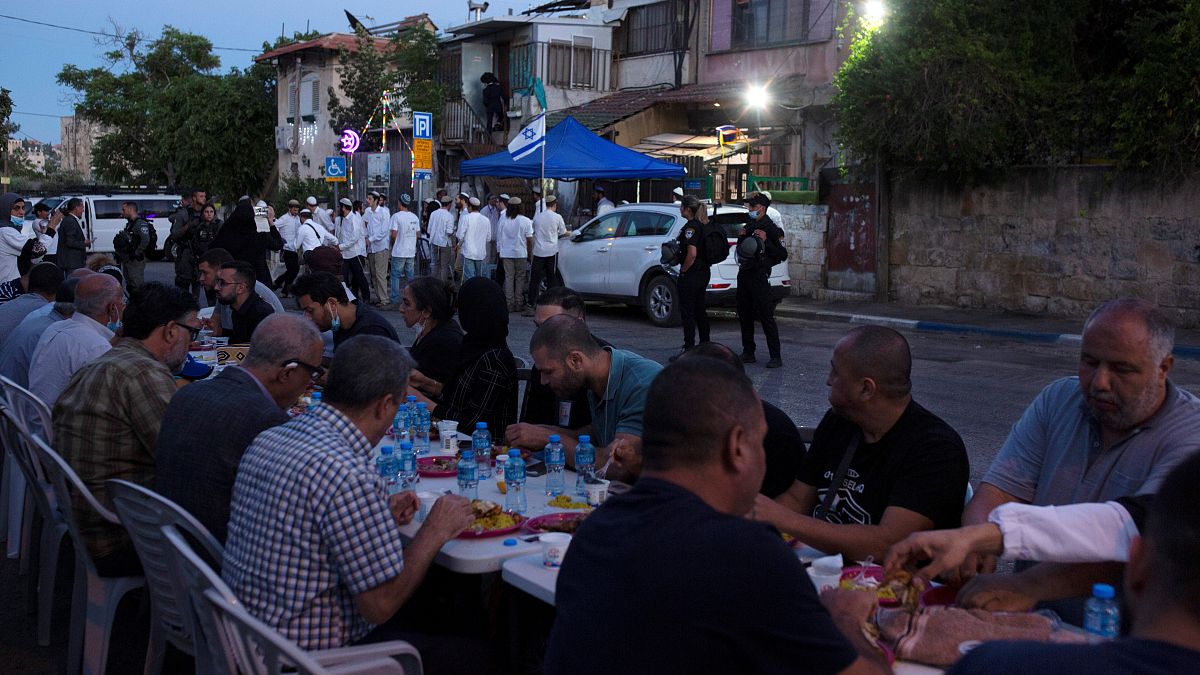One of the sparks that lit the fuse of the latest conflict in Gaza came from a small neighbourhood in East Jerusalem, where Israeli settlers are working to evict Palestinian families.
The war between Palestinian militants in Gaza and Israel, which started last week, is dragging on, with mounting civilian and military casualties.
One of the sparks that lit the fuse of the latest conflict came from a small neighbourhood in East Jerusalem, where Israeli settlers are working to evict Palestinian families.
What is happening in Sheikh Jarrah has been characterised by the settlers and their supporters as a mere property dispute.
But the protests that erupted in the area have reverberated throughout Israel, the West Bank, and Gaza - from where the first rockets were fired towards Israel last Monday.
“We see this is not a small issue”, says Aviv Tatarsky, a researcher at Ir Amim, an Israeli NGO focusing on the conflict in Jerusalem.
In fact, according to him, it has “completely destabilised the region”, leading to the death and destruction being witnessed in Gaza and Israel, and forcing the international community to get involved.
So how did a dispute over the evictions of eight Palestinian families from a small neighbourhood contribute to the latest Israeli-Palestinian war?
Refugees facing eviction from Palestinian neighbourhood
The UN Relief and Works Agency (UNRWA) explains that the people facing eviction from their homes in Sheikh Jarrah are Palestinian refugees, housed there since the late 1950s.
Following the loss of their property in the 1948 conflict, which left many Palestinians stateless, these refugees were moved to Sheikh Jarrah with support from the Jordanian government and UNRWA.
The risk of eviction once again reared its head for these Palestinian families when an Israeli court ruled in favour of a settler organisation, which claims ownership of the land.
A final decision was set to be made on May 10, Israel’s Jerusalem Day which marks the conquering of Jerusalem following the 1967 Six-Day War.
However, in the wake of protests and mounting unrest, the Supreme Court postponed making a decision, and a new date has not yet been set.
“What has happened in the past month is quite remarkable,” Tatarsky tells Euronews.
“How a grassroots protest and resistance have managed to make the Israeli government take a step back.”
Along with the protests, Sheikh Jarrah has been the scene of violence in recent days.
Israeli police said a Palestinian driver rammed into an Israeli checkpoint in the on Sunday, injuring six officers before the attacker was shot and killed.
The unrest there, along with violent confrontations at the Al-Aqsa mosque in the Old City, brought tensions to a boiling point in the days leading up to 10 May.
Then, the rockets and airstrikes began.
‘The power imbalance is as big as it gets’
Tatarsky explains the claim to ownership of the buildings by the settlers is due to Israeli laws, which the Palestinian refugees are almost powerless against.
Similar attempted evictions happened in 2009, which caused huge protests and brought international attention and pressure on the situation. “Since then Israel had to stop evicting families there,” he says.
But the settlers and Israeli government have since been emboldened by the policies and declarations of the recent US presidency of Donald Trump.
“With the backing he gave the right-wing government, Israel resumed many settler projects around the Old City and in Sheikh Jarrah that before it couldn’t go ahead with,” says Tatarsky.
What’s happening in Sheikh Jarrah is just a snapshot of a wider trend.
According to UNRWA, there are nearly 1,000 Palestinians, almost half of them children, who are at risk of forced eviction across East Jerusalem.
And it is happening, according to the agency, “within the context of Israeli settlement construction and expansion, illegal under international humanitarian law.”
Tatarsky says his NGO knows of 200 Palestinian families who are dealing with eviction demands from settler organisations.
“And of course in the past decades dozens of families have already been evicted,” he says, pointing out that the evictions cause far-reaching damage to the whole neighbourhood, not only the families directly involved.
“The power imbalance is as big as it gets,” he says.
“On the one hand you have the state of Israel with all its power, and on the other hand Palestinian residents who are not residents know they do not have a state, no-one is backing them, they are poor families to begin with.”
With the eyes of the world back on the Israeli-Palestinian conflict, Tatarsky hopes the international community may this time take a stance, “after quite a few years where they preferred not to do much.”
The Sheikh Jarrah situation isn’t directly related to the war being waged in Gaza, “but it caused what’s happening in Gaza now and it’s going to stay after a ceasefire,” he says.
While it isn’t yet clear when a decision will be made by the Supreme Court, Tatarsky hopes the protests and the outrage seen by the international community may once again at least put the evictions in Sheikh Jarrah, and elsewhere, on pause.


